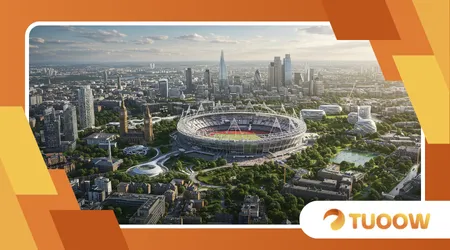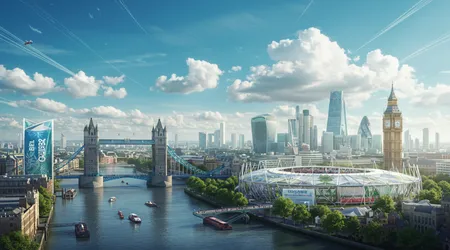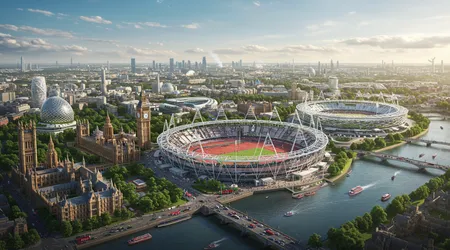London Aims to Host 2040 Olympics: A Bold Vision for History

London Aims to Host 2040 Olympics, a daring ambition unveiled by Mayor Sadiq Khan on April 28, 2025, to make the city the first four-time Olympic host.
This audacious bid targets the 2040 Games, building on London’s storied legacy from 1908, 1948, and 2012.
Khan’s vision isn’t just about sporting glory; it’s a calculated move to cement London’s status as the world’s sporting capital, drive economic growth, and modernize infrastructure.
Yet, skeptics raise valid concerns about costs and long-term benefits. Can London pull off a “brilliant” and “cheap” Olympics, as Khan claims, while delivering lasting value?
This article dives into the opportunities, challenges, and bold strategies behind this historic bid.
The announcement comes at a pivotal moment. London’s 2012 Games were a global triumph, generating £230 million from six major events in 2024 alone, according to a Mayor’s office report.
With Brisbane set for 2032 and potential bids from India or the Middle East for 2036, London Aims to Host 2040 Olympics as its next realistic shot.
Khan’s plan hinges on leveraging existing venues like the Olympic Stadium and Aquatics Centre, promising a cost-effective spectacle.
But the road to 2040 is fraught with financial, logistical, and political hurdles.
Let’s explore why this bid matters, its potential to reshape London, and whether it’s a visionary leap or a risky gamble.
A Legacy Worth Chasing: Why Four Times Matters
The idea of London Aims to Host 2040 Olympics isn’t just about breaking records; it’s about etching the city’s name into history.
No city has hosted the Olympics four times. London’s previous Games 1908, 1948, and 2012 each left indelible marks, from showcasing post-war resilience to redefining urban regeneration.
Khan’s ambition taps into this legacy, aiming to position London as a global leader in sport and culture.
Hosting again would cap a golden era for UK sports. The men’s football Euros in 2028 and the Women’s World Cup in 2035 already promise to elevate the region’s profile.
London Aims to Host 2040 Olympics could be the crowning jewel, drawing millions of visitors and billions in revenue.
Imagine the Olympic flame lighting up Stratford once more, with the world watching a scene that blends nostalgia with forward-thinking ambition.
++ UK Condemns ‘Ethnic Cleansing’ in Sudan: A Moral and Global Imperative
Yet, legacy isn’t just about medals or crowds. The 2012 Games transformed East London, turning derelict land into vibrant communities.
Khan argues 2040 could do the same, modernizing transport and green spaces. But with Saudi Arabia eyeing 2036 or 2040, competition is fierce.
Can London outshine emerging global players to secure this historic milestone?

Economic Upsides: A Tourism and Jobs Boom
The economic case for London Aims to Host 2040 Olympics is compelling.
The 2012 Games delivered £14.2 billion in economic benefits, per a 2013 government report, boosting tourism and jobs.
Khan envisions a similar windfall, with hotels, restaurants, and local businesses thriving. Picture a bustling Covent Garden, packed with international fans, or tech startups in Shoreditch gaining global exposure.
Beyond immediate gains, the Olympics could spur long-term growth. Upgraded transport links, like an expanded Crossrail, would ease commuting for millions.
Also read: UK Becomes First European Country to Ban SIM Farm Devices to Combat Fraud
New jobs in construction, hospitality, and event management could reduce unemployment in underserved boroughs. London Aims to Host 2040 Olympics as a catalyst for equitable growth, not just a two-week party.
However, critics warn of hidden costs. Budget overruns plagued past hosts like Athens 2004.
Khan’s promise of a “cheap” Games relies on reusing venues, but inflation and global supply chain issues could inflate costs.
Will London’s taxpayers foot the bill for a prestige project, or can Khan deliver on his frugal vision?
Infrastructure: Building on 2012’s Foundation
One of Khan’s strongest arguments is London’s ready-made infrastructure. The Olympic Park, with its iconic stadium and velodrome, remains world-class.
London Aims to Host 2040 Olympics by leveraging these assets, minimizing new construction. The Aquatics Centre could host diving, while Wembley Stadium welcomes football, cutting costs significantly.
This approach isn’t just practical; it’s sustainable. Retrofitting venues with green tech, like solar panels, aligns with Khan’s net-zero goals.
Read more: UK Lifts Sanctions on Syrian Ministries Following Regime Change
Picture electric buses ferrying athletes along a revamped East London corridor a model of eco-friendly urban planning.
London Aims to Host 2040 Olympics as the “greenest Games ever,” a bold claim Khan first made in July 2024.
Still, infrastructure isn’t perfect. Aging venues need upgrades, and transport networks must handle millions of visitors.
The 2012 Games saw Tube overcrowding; 2040 could strain capacity further. Khan’s team must plan meticulously to avoid logistical chaos.
Can existing assets truly meet modern Olympic demands?
The Cost Conundrum: Can It Be “Very Cheap”?
Khan’s pledge to host a “very cheap” Olympics is central to his pitch. Unlike Rio 2016, which cost $13 billion, London Aims to Host 2040 Olympics with fiscal discipline.
Reusing venues slashes construction costs, and private sponsorships could offset expenses. Khan’s optimism echoes the 1948 “Austerity Games,” held on a shoestring budget.
Yet, “cheap” is relative. Inflation, labor shortages, and unforeseen challenges could balloon budgets. Tokyo 2020’s $15 billion price tag, despite delays, is a cautionary tale.
Khan’s team must secure ironclad financial backing early. A transparent cost-benefit analysis would ease public skepticism.
Public opinion is another hurdle. Critics, like City Hall Conservatives, argue Khan’s focus on “freebies” and pet projects undermines his credibility.
Convincing Londoners that London Aims to Host 2040 Olympics won’t drain public funds requires clear communication and tangible benefits, like affordable housing tied to Olympic developments.
Global Competition and Geopolitical Stakes

The race for 2040 is heating up. Saudi Arabia’s sports investment boom makes it a formidable rival, while Egypt and South Korea’s North Jeolla Province eye later Games.
London Aims to Host 2040 Olympics amid a shifting global landscape, where emerging economies flex their hosting muscle.
London’s experience gives it an edge, but diplomacy will be key.
Geopolitics adds complexity. The International Olympic Committee (IOC) prioritizes diversity in host cities, which could favor non-European bids.
Khan’s vocal stance on issues like Brexit and Trump’s tariffs, as noted in February 2025, might influence IOC perceptions. Can London navigate these dynamics to win?
A successful bid could also counter global challenges. Hosting the Olympics during economic uncertainty or climate crises would showcase resilience.
Picture London as a beacon of unity, like a lighthouse guiding ships through a storm. London Aims to Host 2040 Olympics to prove that tradition and innovation can coexist.
Community Impact: Beyond the Stadiums
The Olympics aren’t just about athletes; they’re about people. Khan’s vision includes community benefits, like sports programs for youth in boroughs like Hackney.
London Aims to Host 2040 Olympics to inspire the next generation, much like 2012’s volunteer-driven spirit. Local schools could host mini-Olympics, fostering pride and participation.
Small businesses stand to gain, too. A 2040 Games could spotlight markets like Brixton’s, where vendors sell jerk chicken to global visitors.
Cultural festivals tied to the Olympics would celebrate London’s diversity, from Diwali to Notting Hill Carnival. These intangibles are as vital as economic metrics.
Yet, gentrification looms. The 2012 Games priced out some East Londoners. Khan must ensure affordable housing and local hiring are prioritized.
Without community buy-in, the bid risks alienating the very people it aims to uplift. How will Khan balance global ambition with local needs?
Sustainability: A Green Olympic Blueprint
Sustainability is non-negotiable for 2040. Khan’s plan emphasizes eco-friendly practices, from zero-waste venues to carbon-neutral transport.
The 2012 Games set a benchmark with recycled materials; 2040 could go further, using AI to optimize energy use. Imagine solar-powered scoreboards lighting up the Olympic Park.
Data backs the green push. A 2024 Mayor’s report noted £230 million in economic gains from sustainable events, proving eco-conscious planning pays off.
Retrofitting venues with heat pumps or rainwater systems could cut emissions significantly. London Aims to Host 2040 Olympics as a global model for green urban events.
Challenges persist, though. Construction, even minimal, generates carbon.
The City Property Association criticized Khan’s cycling plans for high emissions, a warning for Olympic projects. Public transport upgrades must prioritize electric over diesel.
Can London deliver a truly sustainable Games without compromising scale?
Data Table: Economic Impact of London’s Major Events (2024)
| Event | Revenue Generated (£) | Jobs Created | Visitor Numbers |
|---|---|---|---|
| Champions League Final | 80M | 1,200 | 150,000 |
| London Marathon | 60M | 800 | 100,000 |
| Wimbledon Championships | 90M | 1,500 | 200,000 |
| Total (6 Major Events) | 230M | 4,000 | 600,000 |
Engaging Londoners: Building Public Support
Winning the public’s heart is as crucial as winning the IOC’s vote. Khan’s charisma and love for sport he’s a vocal Liverpool FC fan give him a platform.
Social media campaigns, like #London2040, could rally younger audiences. Picture viral videos of kids training in Olympic venues, captioned “Our Future Champions.”
But skepticism runs deep. Khan’s ULEZ scheme and housing critiques have dented his approval. Transparent town halls and community forums are essential to address concerns.
A 2040 bid must feel like London’s project, not Khan’s. Engaging diverse voices, from cabbies to CEOs, will build trust.
History offers lessons. The 2012 bid united Londoners through shared pride. Recapturing that spirit perhaps with public art installations or Olympic-themed markets could galvanize support.
If London Aims to Host 2040 Olympics, it must be a citywide celebration, not a top-down decree.
Conclusion: A Vision Worth Betting On?
Mayor Sadiq Khan’s dream of London Aims to Host 2040 Olympics is bold, ambitious, and fraught with challenges.
It’s a chance to make history, boost the economy, and showcase sustainability, but it demands meticulous planning and public trust.
The 2012 Games proved London’s capability; 2040 could redefine its global stature. From reusing iconic venues to inspiring youth, the bid promises a legacy beyond medals.
Yet, costs, competition, and community impacts loom large. Londoners deserve a transparent, inclusive process to ensure this isn’t just a mayor’s vanity project but a city’s triumph.
This bid is like a marathon, not a sprint requiring endurance, strategy, and heart. Will London cross the finish line as the first four-time host?
Only time, and Khan’s execution, will tell. For now, the city stands at a crossroads, ready to chase Olympic glory once more.
Join the conversation: share your thoughts on London’s 2040 vision and what it means for our city’s future.
Frequently Asked Questions
Q: How will London fund the 2040 Olympics?
A: Khan plans to rely on private sponsorships, government grants, and ticket sales, minimizing taxpayer burden. Exact budgets are TBD, pending IOC approval.
Q: What venues will be used for the 2040 Games?
A: Existing venues like the Olympic Stadium, Aquatics Centre, and Wembley will be retrofitted, with minimal new construction to keep costs low.
Q: Will the Olympics increase local taxes?
A: Khan insists taxes won’t rise, but critics warn of potential overruns. Transparent financial planning is crucial to avoid surprises.
Q: How will the Games benefit local communities?
A: Youth sports programs, local hiring, and cultural festivals aim to uplift boroughs, but gentrification risks must be managed carefully.
